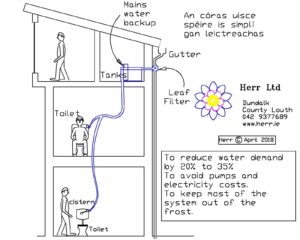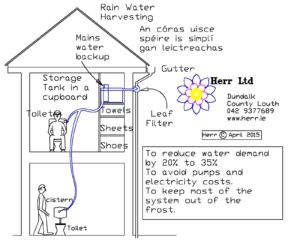Should new buildings in Ireland be required to have Rainwater Harvesting Systems?
With the latest water shortages in Skerries, County Dublin, should new buildings in Ireland be required to have Rainwater Harvesting Systems? Gravity based systems would cost less to install and operate.
Every so often some community in Ireland has to manage without a reliable mains water supply. It’s the turn now of the people of Skerries to have to make do without a proper water supply. To avoid these problems and to reduce domestic water demand, perhaps all newly built homes in Ireland should be required to have a reliable rain water harvesting system?
Gravity based, Mini Rain Water Harvesting Systems for new build houses

Option 1. Below are three diagrams showing the concept of how zero electricity and zero pumping rainwater harvesting stem can work. This first system has a special purpose designed roof that makes it simpler to collect almost all of the rainwater. By storing the water inside the insulated envelope of the house – it will be frost protected.

Option 2. This second diagram below shows a standard roof and collects rain water from one side of the house. It also requiring a purpose built cupboard for the rain water storage tank.
The photo below shows a completed system in Dublin. The storage tanks are located on the top shelf of the cupboard. The lower shelves are for the storage of shirts and sheets and shoes. This is no different than having a hot water tank in a hot press. 

Option 3. Another third option is to locate the rain water storage tank directly above the toilet cistern and hide both in a hidden space behind a removable partition wall.
The Photograph below shows an example of a partition wall behind the toilet bowl that hides the cistern. This partition or removable panel could also hide the additional rain water storage tank.
The removable panel would allow for easy inspections of the ball cock in the cistern as well as inspections and maintenance of the rain water storage tank.
This space will also have the isolation valves, the fine filters and the mains water back up valve. This arrangement of hiding the cistern tank is becoming a predominant sight in public buildings and hotels.
All the Rain Water Harvesting Systems examples shown above have the following advantages:
- These systems require no pumps and they use no electricity. This therefore saves energy and electricity costs and it also hugely delivers on the long term reliability and dependability of the system.
- The harvested water is stored in tanks on the insulated enclosure of the building. This is also an advantage. In this location the winter freezing conditions and the high summer temperatures of an un-insulated attic can also be avoided.
- The Herr mains-water back up valve also uses no electricity. The system will therefore continue to function during electricity power outages.
- The ball cock in this valve discharges above the overflow level of the tank. This is in compliance with water safety regulations in that there is no possibility that rain water can be mixed with mains water.
- As well as supplying toilets the rain water can be used for the clothes washing.
- With a ladder the leaf filters under the gutter are designed for easy inspection and easy cleaning. The fine filters can be easily washed in a sink.
- The simplicity of the system therefore allows a homeowner with basic practical skills to be able to maintain the system.
- All of the advantages above will result in lower costs to the water consumer.
- Having header tanks in the attic for the mains water as well as also having stored rain water will soften the frustration and inconvenience if the water supply from Irish Water ever becomes intermittent or is cut off.
- From a National and Irish Water policy point of view – if most new houses were required to have rain water harvesting, domestic water demand would reduce by about 20% to 30%. Water pressure could be kept lower as a result and this would also reduce water leaks in the water supply pipe network. The public water reservoirs would then be better able to supply water for longer periods during dry spells.
- Rather than relying exclusively on Irish Water, home owners in their own homes would be able to play a part to protect our water supply network.
Contact Herr Ltd for information on costs and supply

